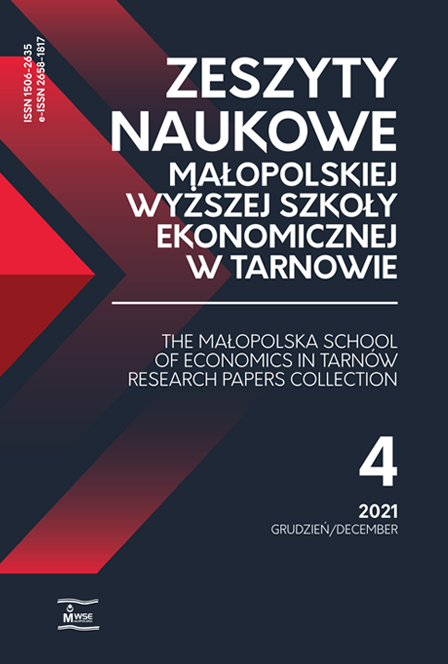Abstract
The article discusses the nomothetic nature of the science of economics. This means that it is a science that discovers and formulates economic laws in order to build theories on this basis. The pioneering approach in such research was presented by mercantilists during the Renaissance, along with the discovery and description of the law of money circulation by M. Copernicus and the Englishman T. Grasham. In turn, in the era of the Enlightenment A. Turgot (in the 18th century), a representative of the physiocrats, described the law of diminishing returns from the land. With the rise of capitalism, the science of political economy was born in Britain (A. Smith). With its development, historically two currents of views on the economy emerge-classical and neoclassical economics, making a huge contribution to nomothetic economics. Modern economy is developing dynamically thanks to outstanding economists, including winners of the A. Nobel from 1969. The last part of the article presents a description of the laws operating in the economy, governing the economic process, broken down into the laws of production and distribution, as well as exchange and consumption (market laws).References
Begg, D., Fisher, S., Dornbusch, R. (1992). Ekonomia. T. 2. Warszawa: Wydawnictwo Naukowe PWN.
View in Google Scholar
Blaug, M. (1994). Teoria ekonomii. Ujęcie retrospektywne. Warszawa: Wydawnictwo Naukowe PWN. ISBN 9788301105426.
View in Google Scholar
Blaug, M. (1995). Metodologia ekonomii. Warszawa: Wydawnictwo Naukowe PWN.
View in Google Scholar
Britannica. Edycja Polska. (2005). Weber M. T. 45. Warszawa.
View in Google Scholar
Malthus, T.R. (1925). Prawo ludności. Warszawa: nakładem Gebethnera i Wolffa. Kraków: Druk W.L. Anczyca i Spółki.
View in Google Scholar
Marciniak, S. (1975). Mikro- i makroekonomia dla inżynierów. Warszawa: Wydawnictwo Naukowe PWN.
View in Google Scholar
Milewski, R., Kwiatkowski, E. (2005). Podstawy ekonomii. Warszawa: Wydawnictwo Naukowe PWN. ISBN 9788301198923.
View in Google Scholar
Nasiłowski, M. (1995). System rynkowy. Podstawy mikro i makroekonomii. Warszawa: Wydawnictwo Key Text. ISBN 9788364928031.
View in Google Scholar
Siekierski, J. (2020). Welfare Versus Poverty in the Views and Theories of the Laureates of the Alfred Nobel Prize in Economic Sciences. Zeszyty Naukowe Małopolskiej Wyższej Szkoły Ekonomicznej w Tarnowie, 2(46), 29–41. DOI: 10.25944/znmwse.2020.02.2941.
View in Google Scholar
Snowdon, B., Hovard, V., Wynarczyk, P. (1998). Współczesne nurty teorii makroekonomii. Warszawa: Wydawnictwo Naukowe PWN.
View in Google Scholar
Taylor, E. (1991). Historia rozwoju ekonomiki. T. II. Lublin: Wydawnictwo Delfin.
View in Google Scholar
WE PWN. (1964a). Historyczna szkoła w ekonomii politycznej. T. 4. Warszawa.
View in Google Scholar
WE PWN. (2001). Bacon J. T. 3. Warszawa.
View in Google Scholar
WE PWN. (2002a). Friedman M. T. 9. Warszawa.
View in Google Scholar
WE PWN. (2002b). Hicks J. T. 11. Warszawa.
View in Google Scholar
WE PWN. (2003a). Nauka T. 18. Warszawa.
View in Google Scholar
WE PWN. (2003b). Nomotetyczne nauki. T. 19. Warszawa.
View in Google Scholar
WE PWN. (2003c). Okun A. T. 19. Warszawa.
View in Google Scholar
WE PWN. (2004). Prawo rynków Say’a. T. 22. Warszawa.
View in Google Scholar
WE PWN. (2005). Turgot A. T. 28. Warszawa.
View in Google Scholar
Wikipedia. (2019). Prawo Okuna. [online, dostęp: 2021-12-12]. Dostępny w Internecie: https://pl.m.wikipedia.org/wiki/Prawo_Okuna.
View in Google Scholar

This work is licensed under a Creative Commons Attribution-NonCommercial-NoDerivatives 4.0 International License.

